Bundesliga Tactics Talk: Round 31
The column naturally also takes its customary comprehensive look at the most recent round of Bundesliga action. In addition to Bayern and Dortmund, Freiburg, Wolfsburg, Hoffenheim, Augsburg, Union Berlin, Gladbach, Frankfurt, and Köln also get their turn on the tactics board this week.
There's still plenty of time left before the world's most colorful and entertaining footballing beat gets rolling once again, so come along for all the analysis ahead of another wild ride! All the best from the Bundesliga lies below!
Bundesliga Tactical Banter: Round 31
Darmstadt's "Official Death"
Not a great deal of time to expend here. SV98 President Rüdiger Fritsch probably put it about as aptly as anyone could hope to when discussing how it feels to experience something sad, yet inevitable. Most football fans - and indeed all human beings - nonetheless know that tragedies one can prepare oneself for are vastly preferable to life's sudden, traumatic, and quick cuts. Darmstadt support for their team rang out loud and clear on Sunday evening at the Merck Stadion an Böllenfalltor. Even if the team's official elimination somewhat embarrassingly came at the hands of fellow promoted side Heidenheim, the team still received audible support. Always nice to see that.
Otherwise, there isn't a great deal to report from a match fairly low on entertainment value. Some of the bright spots on head-coach Torsten Lieberknecht's roster (Tim Skarke, Fabian Nürnberger, Oscar Vilhelmsson, and Julian Justvan) got some whiffs at goal. The lack of quality in the ranks of the league's last-placed team nevertheless remained abundantly clear as all four players failed to supply decent finishing touches. Heidenheim - who despite beating Bayern three rounds back have only won one of their last nine league games - weren't all that much better. The Albogen guests did a slightly better job and got a deserved victory in the end.
More "Neverlosin' Theatrics"
Not to gloss over yet another piece of last-minute brilliance from league-winners Bayer 04 Leverkusen, but there isn't much this column can add to the discussion at this point. Football fans everywhere have become inured to the insanity surrounding Germany's red company team. Saturday evening's 2-2 draw with Stuttgart didn't really engender much surprise across the Bundesrepublik. Stuttgart's 2-0 lead was even shrugged off by most of us Bundesliga watchers. We fully expected Xabi Alonso's team to come back and take the point. Ho-hum. They did. Business as usual. One can appreciate it while, at the same time, no longer being dazzled by it.
Leverkusen simply do their thing. Captain Lukas Hradecky's contention that luck has played a significant role this seasonisn't wrong. His words obviously don't apply to the Saturday's result. Hradecky was spectacular down the stretch. The undefeated streak wouldn't have been preserved without him. The fact that the team performed so well without the suspended Granit Xhaka merits a mention. Exequiel Palacios and Robert Andrich were outstanding in midfield. Piero Hincapie stepped right in to fill in for the injured Jonathan Tah in the second half marvelously. The effort from everyone on Amine Adli's 1-2 showed just what amazing team goals this crew is capable of.
We definitely don't Bayer for granted.
There simply isn't much more to be said.
The "Spiegel Specials": Round 31
Freiburg-Wolfsburg (1:0, 1:2)
This week's three "Spiegel Specials" take a closer look at a highly interesting development from the past round. Namely, that every team currently in contention for the last European places lost. Much as was the case a few rounds back, we find ourselves asking the question "Who wants to play for Europe?" Arguably, not Freiburg, Augsburg, and Hoffenheim. All three teams dropped winnable matches to relegation race contenders. Christian Streich's SCF came up empty against an opponent in even greater disarray than they were during the "Hin-runde". How did the Breisgauer blow it against Wolfsburg?
Sadly enough, the answer leads us to some late match tactical mismanagement from retiring Freiburg trainer Christian Streich. The German footballing legend heads to the rocking chair some time after he's passed his own personal intellectual peak. Streich shall forever be remembered as the charmingly cool old teacher who shared a cigarette with his primary school pupils in the smoking section of the recess grounds. The unfortunate side of that scene, as every German knows, is that the teacher always ready with the lighter can't locate all his mental marbles with the same rapidity.
A strong start
Streich at least had the right idea in building his initial XI. VfL trainer Ralph Hasenhüttl - for lack of better options - kept his 3-4-3 from last week together. A Freiburg 3-4-3 with Ritsu Doan moved back to the wingback slot exhibited cold hard dominance on the right-hand-side. The Lower Saxon guests had absolutely no answer for cycle-based attack waves involving Doan, Roland Sallai, and Michael Gregoritsch. The post came to the rescue of the out-of-sorts VfL defensive ranks twice in the opening 45. All of this worked marvelously.
Lineup—SCF—Match 31 (3-4-3)
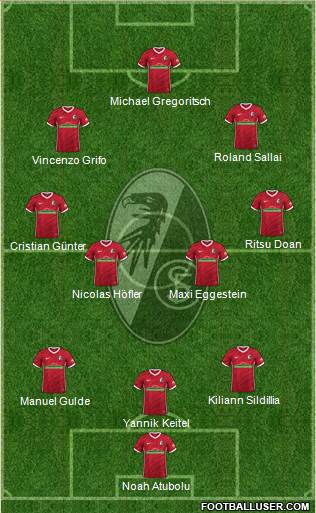
Wolfsburg keeper Koen Casteels - back after a long injury layoff - saved his team's skin just prior to the break. Had the hosting Schwarzwaldverein been able to head into the tunnel with a commanding 2-0 or 3-0 lead, this match might have been over. Germany's green company team had absolutely nothing going their way. The 1-0 halftime scoreline came off a humiliating own-goal from VfL defender Sebastiaan Bornauw. Hasenhüttl employed three changes at the half and reverted to a back-five. One can't rightly say that this did much good.
Lineup—WOB—46th minute (4-3-3)
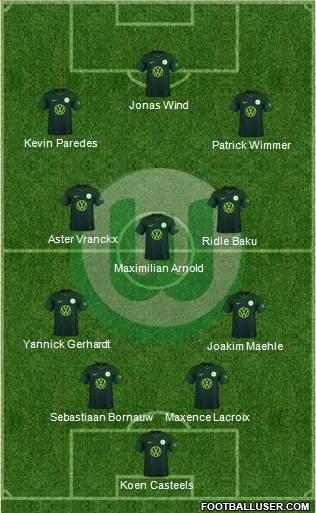
Such a constellation typifies Wolfsburg in general. It looks genuinely menacing on paper. The mere thought of Ridle Baku and Joakim Maehle working over and underlaps behind highly-talented pacey youngsters like Kevin Paredes and Patrick Wimmer leaves one salivating at the squads prospects in open play. As usual, however, it simply didn't work. Hasenhüttl's side had a few more ideas heading forward, yet weren't able to garner even a slight advantage in the necessary nitty-gritty arena of the midfield duels. The match retained it's uncompetitive feel until Streich's major error.
Streich misses the moment
For some reason, the SCF gaffer waited a full ten minutes before employing any personnel changes following the straight red that would end Kiliann Sildillia's season. The basic tactical re-format after Freiburg were reduced to ten-men also took nearly four minutes to crystallize. Having already placed Doan out-of-position, Streich struggled to figure out who he would place on the right defensive rail. The head-coach famous for immediately flashing the shape he wants to see via his fingers instead used said fingers to stroke his chin until he came up with this:
Lineup—SCF—68th minute (5-3-1)
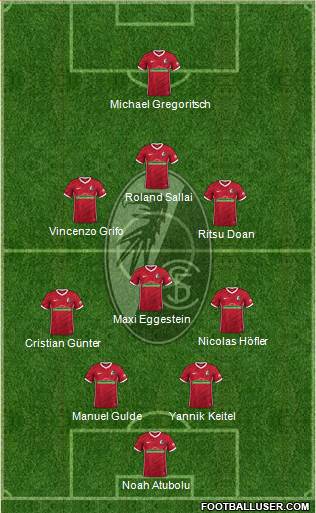
The hosts weren't really certain how to defend at a man-disadvantage. As a result, matters got really choppy, rough, and physical. VfL skipper Maximilian Arnold pulled some beauty out of the sordid, chaotic, and sloppy mess this match had become with a brilliant set-piece goal in the 82nd. Arnold's dead-ball wizardry was then topped by Maxence Lacroix's screamer on what would prove the game-winner in the 90th In-between these two individual pieces of brilliance, Roland Sallai slipped and missed a penalty in the 87th. It simply wasn't Freiburg's day.
Prognosis: Nine possible points
What transpired on Saturday obviously doesn't change the case that Freiburg have by far the easiest remaining schedule of the three European contenders we're covering in this section. Streich's men face Köln, Heidenheim, and Union Berlin to close out the season. While the two relegation candidates look to have something to play for, one fully expects the Breisgauer to roll right over the Heidenheim reserves in two rounds' time. A projected high-scoring win can even ameliorate the team's goal differential issues. Freiburg maintain the status of UECL favorites.
Naturally, this weekend's botching leaves one thinking that additional screw-ups might still be in the cards. Streich's farewell tour has been anything but a smooth cakewalk. The 58-year-old receives only one final home fixture. Choreos and pre-match tributes happen carry the long-time trainer in the only match, Heidenheim, in which a win appears to be easy. Apart from that, we've a tired old head stumbling towards the exit. Some shame it would be to watch the team throttle away the potential of finishing with maximum capture of points. With a wince, one notes it's possible.
Bochum-Hoffenheim (1:3, 3:2)
Our second "Spiegel Specials" section almost delivers a perfect mirror! Quite the interesting and unexpected result here. Omens heading into this one could hardly have been more ominous. Hoffenheim's dismantling of Bochum in the reverse fixture counted as a real tactical masterclass from TSG trainer Pellegrino Matarazzo. Although the American gaffer finds himself prone to more than his fair share of tactical gaffes, one fully expected that he would have his team well prepared for bottom-feeding Bochum. Last week's supercharged 4-3 win over Gladbach meant that the Sinsheimers carried all the momentum here.
Germans apt to skip or skim over the Friday night curtain-raiser had to lock in once Heiko Butscher's Revierklub rushed out to a 3-0 lead. By his own admission, the VfL trainer didn't do anything particularly special. Butscher maintained last week's 4-2-3-1, switching out Takuma Asano and Matus Bero with Maximilian Wittek and Moritz Broschinski on the wings. Bero moved back to take the place of the suspended Osterhage while Ivan Ordets replaced Erhan Masovic in central defense. Matarazzo left his side unchanged.
Lineup—TSG—Match 31 (3-5-2)
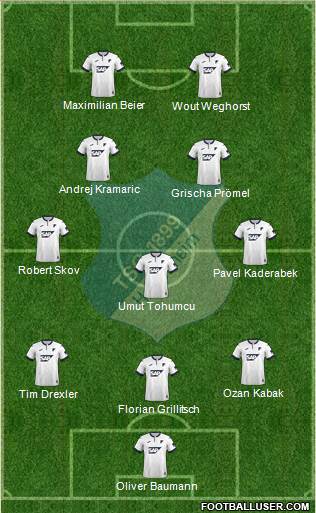
The Westphalian hosts sliced through this construct with ridiculous ease, forcing three stretch saves out of TSG keeper Oliver Baumann in the opening six minutes. "Club man" Kevin Stöger - selected by many German footballing publications as the undisputed "man-of-the-match-day" - ensured that the visiting Kraichgauer were overwhelmed with intensity. After playing perhaps their best opening 45 of the season, Bochum took a well-deserved 2-0 lead into the locker room. Matarazzo went with a double switch ahead of the second half.
Lineup—TSG—46th minute (5-3-2)
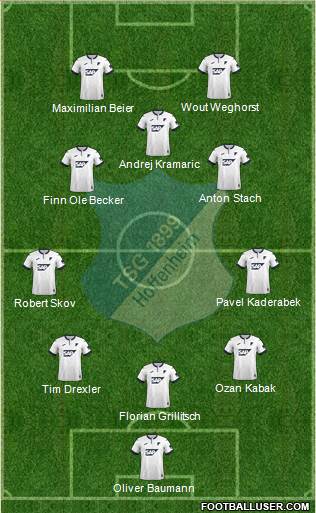
Anton Stach and Fin Ole Becker relieved Grischa Prömel and Umut Tohumcu. One could clearly see that the idea aimed to move Andrej Kramaric into the focal point of attack in a way vaguely reminiscent of what we saw in the Hin-Runde. One can argue that it ultimately worked as a late Kramaric brace nearly saw Matarazzo's men pull off a sensational comeback. The two late pullback goals were nevertheless not indicative of how the second half unfolded. Bochum continued to dominate and scored a third goal. Were it not for Baumann, they might have netted five or six.
Prognosis: Three possible points
Hoffenheim's remaining docket - Leipzig, Darmstadt, and Bayern - should rightly make this squad tremble. When one takes in consideration how poorly the team defended against Darmstadt in the Hin-Runde, even the league's last-placed team hardly counts as a pushover. The genuinely weird nature of this club's season (something Germans find themselves reflecting upon every year) means that they can't exactly be removed from the European discussion. When the roster's talent opts to apply itself, anything can happen. A messy run-in between Kramaric and the ultras suggests they won't.
The safe money belongs on Freiburg.
Bremen-Augsburg (2:0, 3:0)
A sad end to the European dream for the Fuggerstädter. Not long ago it looked a great deal better for the Bavarian Swabians. A second consecutive loss for Jess Thorup's FCA (the first time this has happened under the Danish trainer's watch pretty much seals it, however. Ole Werner's SV Werder Bremen surprisingly picked up their second consecutive win at the WWK-Arena on Saturday afternoon, in the process removing themselves from the relegation discussion. Well done on the Hanseaten for doing the double over their fellow mid table side.
Neither Werner nor Thorup made any personnel or formational changes to their previous set of tactics. After the first-half concluded with a 0-0 scoreline (albeit thanks to disallowed goals) one had the impression that whichever trainer came up with a bright idea to break the deadlock. Both teams struggled to work their way through the highly compact constellations used by the respective sides. Thorup - with the "double Arne" axis of Arne Maier and Arne Engels proving an absolute dud - at least tried to shake things up a bit at the restart.
Lineup—FCA—46th minute (3-3-2-2)
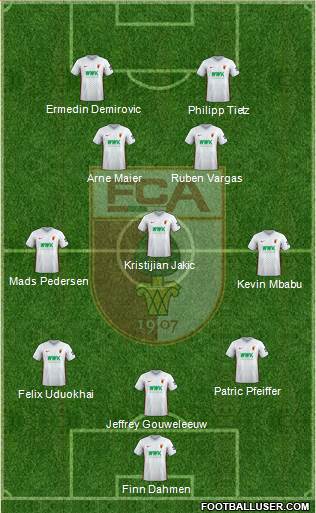
Patric Pfeiffer replaced Engels and the Thorup re-formatted into a back-three. It's very much worth emphasizing that Thorup has - verifiably - failed with every last back-three re-format he's tried this season. This one easily constituted the worst of the bunch, with Pfeiffer choking big time. The former Darmstadt defender conceded the 61st-minute penalty that enabled Marvin Ducksch to give the Hanseaten an insurmountable 2-0 lead. The novel constellation produced zilch in terms of a fight-back. Augsburg wilted and limped the rest of the way.
Prognosis: Zero possible points
The remaining three fixtures? Dortmund, Stuttgart, and Leverkusen. Bah. So much for that discussion. Finishing the season in the upper third of the table counts as accomplishment enough when one considers where this club was heading into the October international break. Thorup stabilized this side via some, admittedly sometimes boring, tactics and pulled them out of the relegation race. The Fuggers enter their 14th Bundesliga season, having still never been relegated from the Bundesliga since achieving promotion to the top division.
Just not a European one.
The "Burning Question": Round 31
How fares the rest of the "Drop Zone"?
Time to shift focus over to the teams that endless anxiety-ridden hurdles to clear before the season is out. We're headed directly into the eye of the "relegation storm" to check on the status on Union Berlin, Borussia Mönchengladbach, and 1. FC Köln. With only three match-days left, places 13th through 17th in the table must contend with some serious heart palpitations. Neither Union nor Gladbach did themselves any favors with a 0-0 draw in Sunday's early kick off. Those of us keeping tabs on it honestly could have done without this eyesore in which neither team reached 1.0 xG.
There were nevertheless plenty of interesting lessons to be learned. The capital city hosts unquestionably have more positives to take from this one. Nenad Bjelica's Eiserenen possess a heartbeat. Several clear signals of will and intent leave one feeling as if the Köpenickers will wake up soon. Union furnished better agility, a greater share of solid ideas, and some palpable momentum. Striker Kevin Volland hit the crossbar and the post with a pair of efforts. Andras Schäfer flashed over from close range. Bjelica himself put forth a pair of serviceable constellations.
Lineup—FCU—Match 31 (3-4-3)
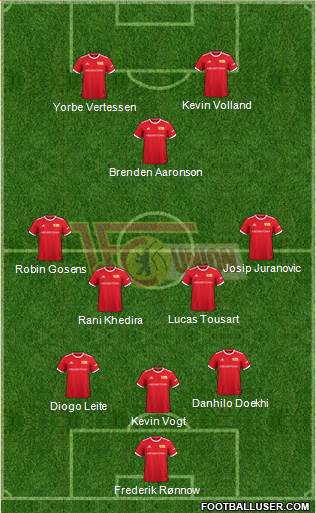
Attacker Brenden Aaronson again ran charges very effectively from his ten-pocket. The American also appeared consistently spry on the counter. The midfield pairing of Rani Khedira and Lucas Tousart ensured that Union retained a regular edge in the trenches. In general, Bjelica's side looked the more confident bunch during the opening 45. A double switch at the half - Andras Schäfer and Robin Knoche on for Yorbe Vertessen and Kevin Vogt - knocked the overall level-of-play up a notch. The Köpenickers outplayed their hosts in the second half as well.
Lineup—FCU—46th minute (3-6-1)
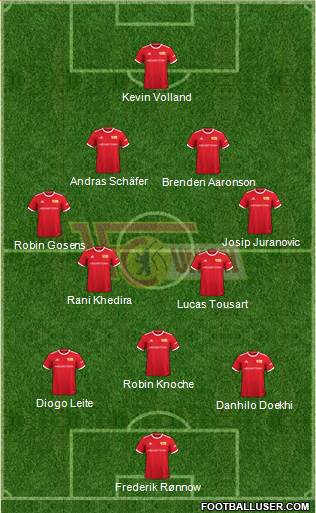
Flipping the back-three pivot got the team working upfield more effectively. Spacing out the midfield more and moving Aaronson to the eight position yielded better play too. Bjelica - as has been noted plenty of times in this column in recent weeks - does understand his players and seems capable of bringing the best out in them. Aaronson, Schäfer, and Volland all got looks in. Robin Gosens and Josip Juranovic transitioned well into their more midfield-centric roles.
Even if - as has been reported - the FCU higher-ups have decided that the team needs a fresh start under a new coach next year, Bjelica's appears set to accomplish what he was brought in to do. The journeyman stabilized this team by staying mostly true to his predecessor's system. Gerardo Seoane, on the other hand, still fumbles for the elusive footballing thesisneeded to get this team going. What a bloody mess the Fohlenelf continue to be.
Lineup—BMG—Match 31 (3-4-3)
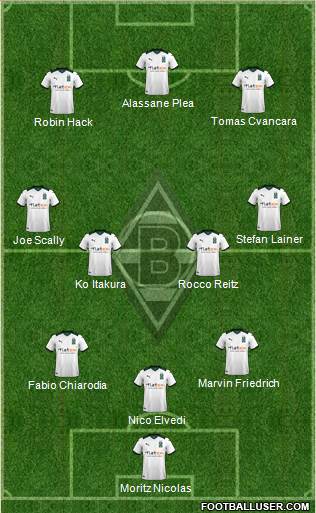
Ugh. It's almost criminal to line a team up with so many spatial gaps in a match one can easily foresee will be decided in the midfield. Union were literally invited to cut off the passing lanes behind the front three. A talented trio of attackers managed absolutely nothing apart from Alassane Plea's soft distance effort. Ko Itakura and Rocco Reitz - a decent six pairing - were forced to carry far too heavy of a burden in transition play. Itakura and Reitz responded reasonably well enough, but ultimately weren't able to make much of anything happen from the deep.
Collectively speaking, this team simply looks scared. Over half of the squad's passing went rearward on Sunday. Confident forward touches were at a premium. Whenever Joe Scally and Stefan Lainer were able to work crosses into the box, a body in the danger area was only there to meet the ball on slightly over a third of occasions. Long carries and dribbles advanced into the area only 30 percent of the time. Optically and statistically, the Fohlenelf are a complete disaster. Timid. Fragile. A shaky entity that has only won one of its last eight games.
One more win should prove sufficient for the highest placed team in the relegation pack to secure Bundesliga football next season. The 13th placed team on 32 points stands tantalizingly close to safety. Can they take one last victory against a closing docket of Werder Bremen, Eintracht Frankfurt, and VfB Stuttgart? Gulp. BMG supporters have plenty of cause to be nervous. Such a field leaves one feeling like two points via draws might be the best-case-scenario. A total of 34 points at the conclusion of the season may not be good enough. Red Alert!
Do Köln still stand a chance?
Timo Schultz's Geißböcke at least managed to keep matters tangentially interesting with their 1-1 draw against Mainz on Sunday afternoon. Köln's ability to overcome Luca Waldschmidt's miss from the penalty spot earns them some serious plaudits. Schultz's crew pushed back the proverbial "nail-in-the-coffin" and picked themselves up a draw against their relegation rivals. Relegation playoff place holders Mainz - with key actors Nadiem Amiri, Brajan Gruda, and Phillipp Mwene now suspended for the upcoming league encounter against Heidenheim - suddenly have big problems as well.
Five points below the playoff place, chances that Germany's cathedral city side can pull off a great escape appear slim. Arithmetic still accords the Effzeh a chance. Moreover, what we witnessed in the closing stages of the last fixture offers some glimmer of hope. Köln require something of a footballing miracle to punch their way out. It's worth noting that they are still punching. Club supporters and neutrals alike hope to see this side go down swinging. Some signs suggest they can do just that. Before getting to the good, however, we must address the ugly.
Lineup—KOE—Match 31 (4-2-3-1)
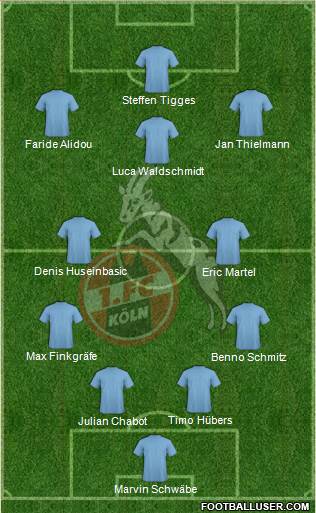
Horrible. Wretched. This arrangement amassed a paltry 0.17 xG in a first half to forget against Mainz. The Domstädter can count themselves extremely lucky that FSV forward Jonathan Burkardt didn't put the match to bed in the opening 45. Waldschmidt's penalty scoff three minutes after the restart seemed to dissuade Schultz from even making an effort to switch things up. The Effzeh gaffer waited until the 62nd to introduce his first subs. Mark Uth, Damion Downs, and Linton Maina replaced Waldschmidt, Steffen Tigges, and Jan Thielmann on a triple change.
Lineup—KOE—63rd minute (4-4-2)
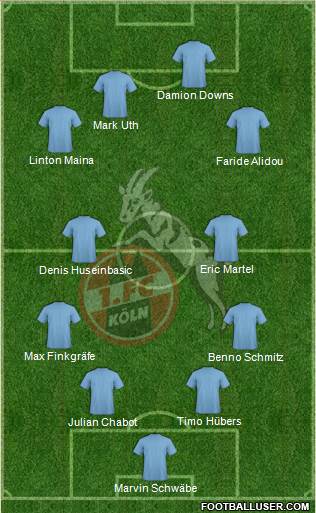
Schultz loosely adhered to this system even after seemingly going "all in" via the substitutions of Florian Kainz (for Denis Huseinbasic) and Sargis Adamyan (for Faride Alidou). Everyone pushed forward on a hard press, but the basic structure remained in place. One enormous benefit of maintaining the construct concerns the fact that Mainz couldn't sort their marking assignments out. It was such that Uth, Benno Schmitz, and Adamyan produced decent opportunities. The controversial penalty call was also a direct result of Mainz's inability to handle Köln's long vertical lobs.
Kainz's 90+5 equalizer from the spot felt deserved. The Westphalian guests thrived in their new shape and demonstrated fantastic morale down the stretch. Schultz's team could have even potentially grabbed all three points, though match official Benjamin Brand correctly denied them a third chance to convert a penalty for what would have been a soft handball call. A little something stirs within this assemblage. Mainz's closing slate - Heidenheim, Dortmund, and Wolfsburg - does actually give them a chance to make up ground against Freiburg, Union, and the FCH.
They have a chance.
Hard to believe, but true.
"Weekly Wortschatz": Round 31
"Boulevard-Journalismus"
The fact that the administrative struggles of German record champs FC Bayern München presently dominate most of the German footballing headlines is to be expected. After all, Bayern's fall off their 11-year-perch at the top of the Bundesliga table constitutes fairly huge news. A development the columnist didn't quite expect concerns the quick disintegration of interest within the German public sphere in general. One would think that - with little reason to have sympathy for Bayern's self-inflicted in-house problems - more German football lovers would have interest in all the sensationalist stories being printed in the tabloids.
When it comes to the topic of interest in tabloid sports journalism, one thing needs to be made absolutely clear up front. People generally like it whether or not they're prepared to admit it or not. Germany's main tabloid "Bild" still maintains a print circulation that covers nearly one-eighth of the entire German populace every single day, in large part because of its sports coverage. It's not an uncommon site at all to see people purchase the "Bild" Sunday edition at the kiosk, fish out the sports section, and dispose of the rest of the paper in the nearest bin. Copies of the weekly "Sport Bild" often sell out within hours.
Even those of us who like reading the more high-brow publications (the columnist included) still purchase the tabloid for the sports news. While there may be some clearly manufactured stories we're not interested in, many of the player features are richly detailed with useful information. Transfer rumors (usually well sourced) hit the "Boulevard Press" first. The wordplay remains fun and second-to-none. Sometimes someone needs a good laugh. Why, then, are so few Germans laughing at Bayern? Why are the kiosks stock full of Uli Hoeneß/Thomas Tuchel headlines that no one wishes to buy?
Most footballing kiosk hounds don't even wish to discuss the issue. The primary reason relates to fatigue. We've got it. The club lost its way. This much has been apparent since last spring's sacking of Julian Nagelsmann. The chain-reaction of events that followed gradually became less interesting, not to mention more and more predictable. Tuchel stood little chance of surviving without the two administrators (Oliver Kahn and Hasan Salihamidzic) who controversially hired him in the first place. Much to our collective chagrin, Uli Hoeneß and Karl-Heinz Rummenigge returned to the FCB front office last summer.
The fact that those two functionaries, successful and important to German football as they may be, also happen to be world-class assholes isn't exactly news. Few Germans seem interested in Hoeneß' latest bit of asinine behavior. It's been kind of a letdown to realize that we're not done with him. Some asinine comments from his retirement hovel every so often would have been welcome. Alas, the septuagenarian's accosting of Tuchel on the training pitch last spring reminded us that one is never really done with a character like that. Ah hell. "Partial limelight" just doesn't work for him.
"Beyond the Boulevard"
This being the linguistics section, the author thought it might be prudent to explain why Germans still use the word "Boulevardzeitung" to describe tabloids. It will probably surprise few to learn that the words origins come from the first "tabloid style" newspapers to be printed in California locales such as San Francisco and Los Angeles. The phrase was commonly used in both American and British English through the late 19th and early 20th century. Eventually, more familiar modern alternatives. English speakers recognize "rag papers" and "yellow journalism", yet can't comprehend "Boulevard-sheet".
A German crack at a more modern alternative that never really took hold is the now incomprehensible "Revolverblatt" ("revolver sheet"). This actually counts as something of a shame as the phrase almost perfectly explains how German tabloids work. There is plenty of real journalism to be found in the tabloids. In order to keep circulation numbers up, however, the press usually alternates between more nuanced and more sensationalized stories; much like the bullet chambers in a revolver. This never really caught on, even though it still fits the mold of both German and British tabloids.
Germans settled on "Boulevard-Journalismus" mostly because - for the longest time - most German tabloids didn't offer a home subscription format. One bought "Bild" on the street whilst having the "Süddetusche" or "FAZ" delivered at home. How the term has persisted since the digital age turned the entire world of journalism on its head is beyond this columnist. The persistence of "yellow journalism" in British and American parlance is similarly weird, given that most tabloids have red mastheads. Perhaps "street paper" and "yellow paper" just fit what one might consider more disposable news.
...or maybe Germans just like thinking of "Boulevards" in sunny Los Angeles. Nothing competes with "California Culture" when it comes to borrowing English phrases. Fitting enough that Bayern, the Germany's of "FC Hollywood" (Yes, Germans actually call them that), still dominates the headlines despite the fact that Germans seem less interested in talking about them than ever before. The tabloids know that we'll come back to their coverage at some point, particular in a year in which they're representing our country deep into the Champions' League tournament.
How fares "FC Hollywood"?
Tactically, quite well. It's not a surprise at all to see FCB supporters circling a petition to get Tuchel to stay. The departing trainer has demonstrated his first-rate tactical acumen in recent weeks. The former Mainz and Dortmund gaffer always knew how to get the best out of a reduced talent pool. The slew of Bayern injuries during the latter half of this season has accorded him the chance to do just that. Many in German footballing circles currently tend towards the uncomfortable conclusion that Tuchel just came to the club at the wrong time and got caught in a bad managerial maelstrom.
Beginning with Saturday's league win:
Lineup—SGE—Match 31 (4-2-3-1)
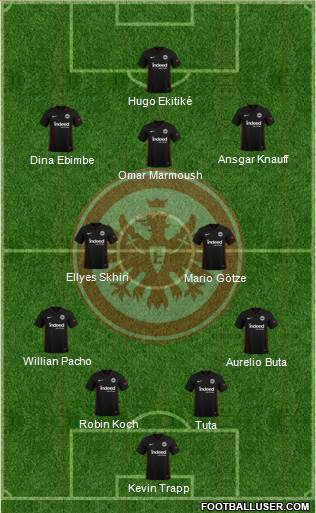
Eintracht Frankfurt trainer Dino Toppmöller - a former Nagelsmann assistant - initially rolled out what he thought would be a mirror of Tuchel's 4-2-3-1. The FCB trainer didn't exactly keep us guessing with the team-sheet. With the likes of Noussair Mazaroui and Joshua Kimmich enshrined in their fullback roles, it was fairly apparent that where Thomas Müller, Raphaël Guerreiro, Konrad Laimer, and Eric Maxim Choupo-Moting would settle. Choupo's use as a service striker made perfect sense in that the German had time to practice positional shifts with Harry Kane all week.
Lineup—FCB—Match 31 (4-4-2)
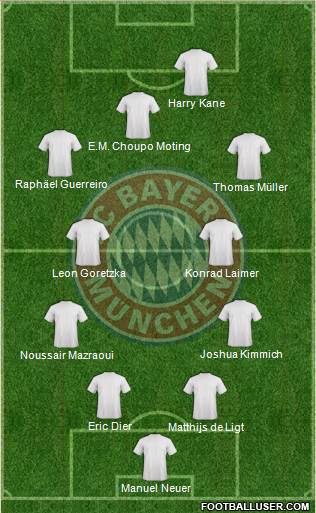
Eintracht took a long time to catch up with this. Kane slotted home the 1-0 inside of ten minutes once Konrad Laimer pounced on an error from the out-of-position Willian Pacho. Hugo Ekitiké's 23rd-minute equalizer came very much against the run-of-play. Eintracht had nothing else to offer over the course of a dominant first half from the Bavarian hosts. SGE keeper Kevin Trapp kept the overmatched Hessian guests in it via great saves against Müller, Choupo, and Guerreiro. Bayern never missed a beat despite losing Laimer to injury in the 23rd.
Reason for the FCB slow-down
Matthijis de Ligt's loss to injury just prior to the restart didn't help matters. Even though Min-Jae Kim (as opposed to in the Champions' League) did well enough in relief, the manner in which the de Ligt-Eric Dier partnership has continually served as an organizational bedrock out of the back couldn't easily be compensated for. One felt that the FCB attack charges lacked a certain pace to them. Eintracht had an easier time absorbing waves just missing that extra bit of pep. None of that should suggest that Bayern relented or ever looked the poorer side.
A solid win....
Although the penalty that enabled the record champs to retake the lead fell on the softer side, three points were fully merited on this day. Trapp had to intervene on several more occasions to keep Tuchel's men from increasing the lead. Final xG stats saw Bayern top their opponents by nearly a 6:1 ratio. Duel rates neared 60 percent both on the ground and in the air. The FCB machine also racked up overall passing stats in excess of 90 percent. Neat, clean, and efficient stuff from the German giants.
....yet problems still linger
Jamal Musiala (tendon inflammation) and Leroy Sané (pubic bone issues) returned to the XI. The nature of Sané's injury regrettably means that the star German international shall be playing through pain for quite some time. Laimer showed little-to-no signs of the ankle issues that forced him off against Frankfurt. Unfortunately, that's about where the good news regarding existing issues ended. As many had feared, Kim's return brought with it the same issues associated with the South Korean international's recent form.
Lineup—FCB—UCL (4-2-3-1)
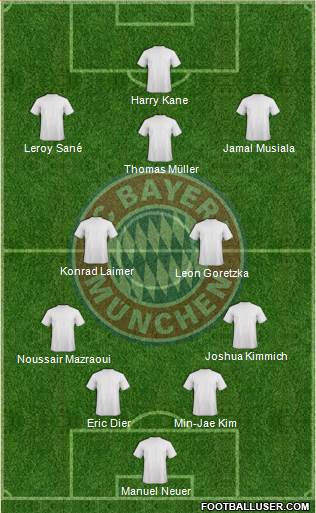
Before totally laying into Kim, one should note that marking Vinicius Junior is by no means an easy task. There were instances in which de Ligt's replacement defended resolutely. That being said, the 27-year-old's game wasn't good enough for this level. One single twitch from the Brazilian fooled him on Real's 1-0. Kim found himself similarly duped in at least two more such instances. Kim was extremely lucky that Manuel Neuer bailed him out in the 79th. Of course, the penalty conceded might very well cost Bayern their spot in the Final. The "monster" moniker assigned to this player takes on a new meaning.
Additional problems
There didn't appear to be all that much of a tactical change accompanying Tuchel's switch to Guerreiro over Leon Goretzka at the half. The Portuguese international's introduction obviously heralded a slide right from Laimer. At times it looked as if Guerreiro operated slightly further ahead as part of a split stagger. Overall evidence for this is too inconclusive. The real reason for Goretzka's subbing off was that the out-of-form German international simply wasn't hacking it in the duels. He won just one of his six ground challenges and turned the ball over on three occasions.
Musiala and Sané showed signs of rust whilst Müller clearly fought with fatigue. The two wingers more than redeemed themselves with their involvement in the two goals, though early misses from both players on early chances could have led to a much different result. Müller sent (by his standards) an uncanny seven passes stray. Neuer wasn't at his best passing-wise either and, crucially, hesitated to come out on the 1-0. No one likes taking a searing magnifying glass to players like this, but the stakes at hand demand it. Just wait until the German hosted Euros. It will get worse.
Hopes for a Hollywood ending?
Assuming de Ligt's knee problems clear up in time for the second leg, there's more than enough positives to take away from the opening leg draw. Kimmich and Mazraoui both put in above average defensive performances. Admittedly, with Jude Bellingham functioning as a striker, Carlo Ancelotti's Spaniards weren't all that interested in attacking down the flanks. They knew precisely where to hit the Bavarians where it hurt; in their "€200 million disaster area". Kane did an even better job as a set-up-man than an actual shot producer. That's why the living legend is easily worth double what Bayern paid for him.
Why are Germans suddenly rallying around Bayern and eschewing all the bad press? The subject of the lack of cognitive dissonance in German footballing fandom has been brought up in this column more times than the writer can personally count. We want them to succeed in the Champions' League. We also want them to prevail against Carlo Ancelotti; who arrogantly remarked earlier this week that he had "forgotten all his German". No one wants to read about how Ancelotti's sacking at Bayern was the beginning of this team's coaching and administrative downfall. The Italian trainer is our enemy now.
Interest in what the tabloids try to bait us with might pick up again if Bayern are eliminated from the UCL next week. For now, it feels like a club that has already seen its run of Bundesliga titles been broken is being beaten up at an inappropriate time. The "Boulevard Presse" has crossed something of a line. The record champs have but one trophy left to play for. In the process of so doing, they play for us. Er...one might as well admit that we'd also like Kane to continue playing for us so that we can watch him every week next season. Let the Englishman at least get the whiff of a trophy!
"Thema Tod geritten"
We'll now segue to Dortmund, but not before getting to a linguistic expression that applies to both German Champions' League Finalists. If there's something that Germans are more sick of hearing about than all the "yellow press" surrounding Bayern, it has to be all the disappointment associated with the Bundesliga's "yellow club" over the past decade. Whilst allowing these two topics around in his brain over the past week, the author himself found himself in something of a "linguistic limbo". Some light research led him to the interesting discovery of a false-equivalent German-English phrase combo.
When Germans grow tired of a topic, we bust out a horse idiom. We complain that the "Thema" ("topic") has been "ridden" ("geritten") to death. Push a good horse too far without water and rest and one's equine transport will collapse underneath one's feet. Continentals figured this out the hard way. The poor creatures have much more fragile legs than one might expect. Perhaps the image of a horse being whipped to death led the columnist to the false assumption that the British "flog a dead horse" and the American "beat a dead horse" were related. Not the case. The two are totally unrelated.
When one takes a minute to think about it, the difference between the two idioms should be obvious. The English phrase(s) aim to convey an act that is pointless whereas the German expression describes the act of covering a tired and clichéd subject. With a little bit of creative license, one could presumably say that those two actions belong in the same category. That nevertheless borders on a haughty attitude; something translators must avoid at all costs. It's not our place to judge what is useless and what isn't. Hence, to convert one to the other would be an egregious error.
One can still translate "beating a dead horse" into a horse-riding related phrase, for example by saying that someone "reitet etwas herum" ("rides circles around something). Far better translations would nevertheless be "Zeit verschwenden" ("wasting time"), "sich vergeblich bemühen" ("laboring to no avail"), or - assuming one wants to reach for the Greek mythology "Sisyphuserbeit betreiben" ("pushing that proverbial boulder up the hill"). This season's Dortmund-basing falls squarely into that category. Why were so many of us confident that they could beat PSG despite all the talk?
What went wrong against Leipzig?
Not a great deal in the opening 20 minutes leading up to Jadon Sancho's 1-0. Edin Terzic's "Schwarzgelben" produced plenty of scoring chances. Personnel-wise, the team began at a disadvantage without the suspended Ian Maatsen and (he's improved a great deal) Emré Can. The team's current midfield pacemaker - Marcel Sabitzer - also had to pass on short notice due to an infection. Terzic adjusted for all of this by building a defensive-minded 5-2-3 with a shockingly large gap between the six axis and the front three. Ridiculous wide though it was, it did work.
Lineup—BVB—Match 31 (5-2-3)
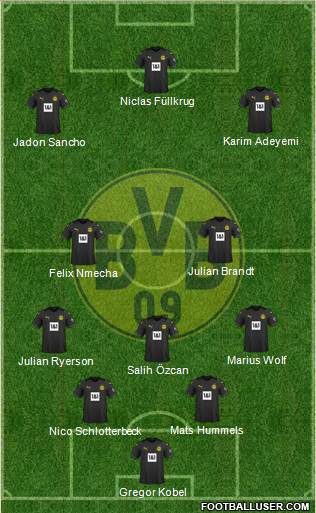
Matters ended up grinding to a halt for three specific reasons. First, Leipzig are simply a red hot team on the march. Marco Rose's German Red Bulls entered this encounter having nearly picked up maximum points (19 out of 21) from their last seven fixtures. The performance last week proved that Rose's 4-2-2-2 is clicking on all levels. Once the RB constellation got wind of the spatial pockets associated with the BVB formation, the tide of the match quickly shifted towards Saxon dominance. The hosts power-pummeled Dortmund until they captured a 2-1 halftime lead.
Irrelevant half-time adjustments
Terzic attempted to back track by re-ordering his team into a 4-2-3-1. This was accomplished by bringing Marco Reus on for the woefully ineffective Karim Adeyemi, moving Salih Özcan off the sweeper position, and getting Julian Brandt forward on the wing. There were naturally risks associated with depriving the defensive corps of their plug in Özcan. Fullbacks Marius Wolf and Julian Ryerson, a pair of unpredictable types to say the least, had more ground to cover. All of that notwithstanding, we never really received the opportunity to assess this.
Lineup—BVB—46th minute (4-2-3-1)
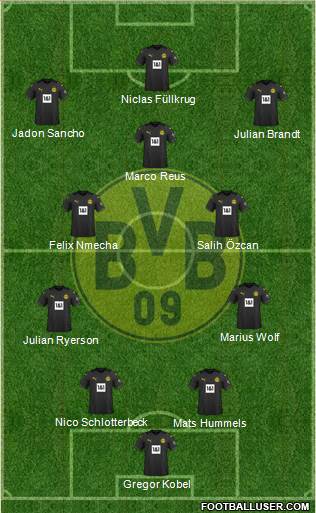
Mohamed Simakan's 3-1 seconds after kickoff immediately erased whatever utility this re-format might have. Via four staggered single substitutions, Terzic gradually worked his way towards one of the more novel and successful concepts he used during the team's strong start to the calendar year. A variant of the previously observed 3-2-2-3 obviously didn't work as well without Donyell Malen, Sabitzer, Maatsen, and a third trained center back. Leipzig maintained full control over the game. Dortmund also lacked much general will to get anything going.
Lineup—BVB—72nd minute (3-2-3-2)
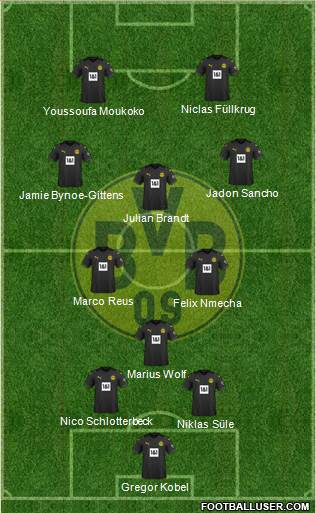
The mere act of witnessing this again did nevertheless leave one with the feeling that Terzic and his coaching team had something up their sleeve for Wednesday's big Champions' League match-up. The fact that set-piece designs in the league encounter were strictly bare bones further strengthened this hunch. Just like anyone and everyone else, all those associated with a football team must effectively partition their creative energies whenever facing a heavy workload. Everything important came out when it counted.
Lineup—BVB—UCL (4-1-4-1)
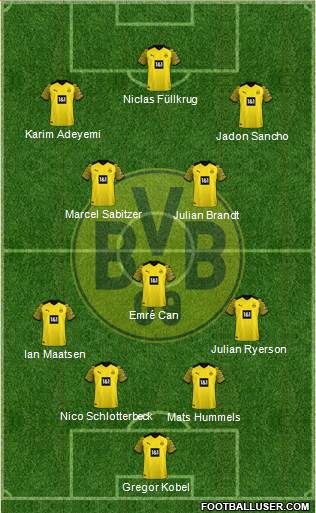
Can's return facilitated more reasonable spatial arrangements in a more comfortable 4-1-4-1. Getting Brandt and Sabitzer up to eight-level lended the attack a much smoother feel. Ryerson's return to the right-hand-side (on which the Norwegian generally plays better) greatly abetted the team's rhythm. Adeyemi's inclusion on the team sheet after his poor league performance came as something of a surprise, but perhaps (for lack of a better option) simply having him and Sancho switch flanks constituted a serviceable enough solution to keep things fresh.
The red-hot Sabitzer twice saw himself robbed of a goal from PSG keeper Gianluigi Donnarumma during Dortmund's dominant first half. Niclas Füllkrug's 1-0 - to quote Brandt from earlier in the season - wasn't exactly an "Augenschmaus Tally", yet got the job done for the German hosts. The half-time scoreline adequately reflected the match's xG. When it came time to defend the slender lead, Terzic didn't order anything particularly special from the team. He simply trusted everyone to defend from their initial positions. This ended up paying off.
A brief spell of PSG pressure
Former Dortmund man Achraf Hakimi came closest to securing the equalizer with a strike of the post in the 52nd. This capped a series of dangerous PSG attack waves that began to pressure the leading team from the restart onwards. While those eight minutes were certainly rather nervy, a little difficulty keeping up with the French champions must be forgiven. The Westphalians - thanks in large part due to diligent defending from Mats Hummels and Nico Schlotterbeck - withstood this pressure phase. By the half-hour-mark, Dortmund were back looking comfortable again.
A couple of late PSG close calls
Two more chances from the French guests in the final ten minutes threatened to deprive Dortmund of the slender victory. These two can be chalked off as it was Terzic's side that looked the more likely to extend their advantage via the likes of Brandt and Füllkrug in the closing stages. Dortmund - having absolutely everything to fight for - both kept their nerve and didn't shy away from taking risks in this crucial encounter. The much-maligned German football club delivered a both chance at the Final for themselves and a fifth UCL spot for their country at the same time.
Dortmund's nadir
Although Dortmund have been thriving in the Champions' League since this past autumn, it's possible to pinpoint the exact recent fixture after which most of us became convinced that the team would cease to tolerate all the abuse in the press. The home loss to Stuttgart on the weekend of the Westfalen Stadion Anniversary celebrations surely served as the last straw. A side largely deprived of German national team representation lost in front of their hometown fans to the very team that took away most all of their slots on the national team roster had to represent the low point.
That's enough. No more. A significant swath of Bundesliga watchers began believing in Dortmund from that point forward. The elimination of all English sides from the Champions' and Europa League competitions at the quarterfinal stage this year accorded this German team a chance to seal the UCL coefficient race in front of their loyal supporters. Belief in this team soared when thinking back to how Eintracht Frankfurt - despite a shitty league season - delivered us five Champions' League places two springs ago. We had every reason to believe. So too did they.
Sensationalism, rejected
German feelings on the sort of coverage Bayern and Dortmund presently receive in the tabloids can perhaps best be summed up by an English idiom for which (to the writer's knowledge) there is no real German equivalent. Whenever English speakers grow tired of someone bullying an easy target, the phrase "stop beating that mangy dog!" crops up. A sad sight to behold. Some aged and unkept canine getting the rod for the simple crime of hanging around the back yard in search of some table scraps and a little love. At a certain point, it just becomes heartless.
In a German footballing context, Dortmund represent the mangiest of all mangy dogs. An 11-year-title drought (anywhere from 77 to 105 annum in dog years) just leaves us tired of watching this scruffy mongrel get drop kicked off the porch. It's just way too cruel at this point. Moreover, it's totally out of proportion. Veterans Reus and Hummels have furnished us with some amazing play in their twilight years over the last two seasons. Slight dips from Brandt and Schlotterbeck are enough to keep them off the ultra-competitive national team, but they remain generation talents.
Emré Can.....okay, he's pretty much finished....until he proves us all wrong by scoring the game-winning goal in the Champions' League Final against Bayern. There we go. The BVB captain wraps up his totally miserable season by immortalizing himself as one of the greatest German footballing heroes of all time by delivering six Champions' League places to the Bundesliga. There we go. The next few weeks mapped out in the latest edition of "Tactics Talk". The columnist might as well had that he also expects his country to get crushed in the Euros.
Choose whatever weary/dead animal one likes there.
Thanks so much for reading! You can catch the release of all Peter's columns (and occasionally catch him goofing off) on whatever the hell they're calling twitter these days @PeterVicey.
Twitter DMs are open for football conversations, corrections, and (if you truly insist) general abuse.
Full color re-posts of the columns are eventually archived on Peter's website.